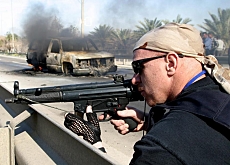Swiss target private military firms

Switzerland is taking the lead in efforts to ensure human rights are respected by an ever-increasing number of private military companies around the world.
Paul Seger of the Directorate for International Law at the foreign ministry tells swissinfo about the motives and the approach the Swiss have chosen.
The foreign ministry and the International Committee of the Red Cross (ICRC) have called a closed-door meeting of experts in Montreux next month.
A first workshop with government representatives from nine countries, including the United States, Britain, South Africa, France and Germany, as well as from the security industry took place at the beginning of the year near Zurich.
Participants discussed a range of options to regulate such companies, including an obligation for firms to vet employees, training in international humanitarian and human rights law, and sanctions.
swissinfo: Why is it necessary to establish legal standards for security companies working in conflict zones around the world, notably in Iraq?
Paul Seger: The number of military security companies has been growing worldwide and has reached an international dimension. There are more and more states that make use of such private military and security companies.
Therefore we believe it is the right moment to remind states of their international obligations if they give mandates to such companies. The aim is to reach some common standards of applicable international law in using such companies.

More
Geneva Conventions
swissinfo: What qualifies Switzerland to take such an initiative?
P.S.: Switzerland has always had a strong interest in promoting international humanitarian law. We are the birthplace and the depositary state of the Geneva Conventions.
As a result we are cooperating with the Geneva-based International Committee of the Red Cross to promote human rights and humanitarian standards in the context of private military contractors.
swissinfo: What are Switzerland’s aims when it invites experts from more than 20 countries as well as companies to a meeting in Montreux next month?
P.S.: Primarily we want to remind states of their obligations. It is not true that private military companies are operating in a legal no-man’s-land. There are plenty of rules anchored in general international legislation, in humanitarian laws and human rights.
It is not about banning military companies, but we would like to create model rules of best practice as part of a set of common legal standards of applicable international law.
The target is not necessarily an international convention because this is difficult to achieve.
We hope international organisations and non-governmental groups will take an active interest in the issues at stake.
swissinfo: What are the main difficulties you are up against?
P.S.: We have to try to convince other states that we have modest goals and don’t seek to prohibit or hinder such private military companies.
We have to create a basis of confidence and explain that we have a humanitarian purpose. I’m convinced that we can get far if we choose a step-by-step approach. This might be slow and some might say typically Swiss, but it’s more realistic than trying to reach the impossible.
swissinfo: The meeting in Montreux is not the first – experts came together near Zurich at the beginning of the year. What has been the response?
P.S.: We feel encouraged by the positive response from countries, including the US, which has a large contingent of private military firms, and also from organisations which took part in the first workshop last January.
We now aim to extend the circle of countries which participate in this ongoing process and to see that we can find a possible common denominator among a large group of likeminded countries and other states which show an interest.

More
International Humanitarian Law
swissinfo: What steps are necessary on a national level in Switzerland?
P.S: If we want to be credible, we have to apply at home what we hope to achieve on an international level.
The government published a report last year on the current practice of private military companies in Switzerland.
The justice ministry is also working on a project aimed at setting common rules among the country’s 26 cantons where such companies might have their headquarters.
At the moment there no exact figures on the number of such contractors in Switzerland which operate internationally.
swissinfo-interview: Urs Geiser
Private military companies (PMCs) operate in more than 100 countries around the world.
They have an estimated annual turnover of $100 billion (SFr123 billion).
It is believed that in Iraq alone there are some 15,000-25,000 employees of PMCs and private security companies (PSCs).
The Swiss government has hired the service of a foreign company to provide security for its liaison office in the Iraqi capital, Baghdad.
Private military companies (PMCs) are often involved in security operations, including logistics, but some of their members are also in combat.
Their legal status is not that of mercenaries who are employed by a regular army or a militia.
The emergence of PMCs is seen in the context of the end of the Cold War with countries reducing their armed forces and a growing number of conflicts involving militias and rebel groups.
As a result an increasing numbers of former soldiers, notably in former Soviet Republics, were available who could also operate complex weapons systems.

In compliance with the JTI standards
More: SWI swissinfo.ch certified by the Journalism Trust Initiative











You can find an overview of ongoing debates with our journalists here . Please join us!
If you want to start a conversation about a topic raised in this article or want to report factual errors, email us at english@swissinfo.ch.